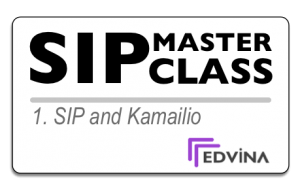The SIP Masterclass :: 1. SIP and Kamailio

Learning SIP and Kamailio during four days of intensive labs and lessons – an extensive training class!
- Four days of labs and lessons
- In Madrid, Spain February 20-23, 2017
- Learn Kamailio – the Open Source SIP server – from start!
- Understand the SIP protocol – methods, URIs, extensions and more
Open Source SIP tools are changing the telecommunications marketplace forever. They are used everywhere, from small enterprises to large call centers and carrier class networks with millions of subscribers. As the world migrates away from copper-bound telephony to realtime communication over IP, with multimedia, chat and presense, these solutions pave the way for the future.
This class is built for persons that have used the PBX-class tools like SIP switches, Asterisk, Yate and FreeSwitch and wants to learn how to scale and add new applications like presense and instant messaging to their solution.
The class will spend a lot of time on the SIP standards, then move on to how to implement them using Kamailio – the Open Source SIP server – in combination with other tools. After the class, you will not only know how to operate Kamailio – you will also have a lot of knowledge about how the SIP standard works, what to expect from devices and how to troubleshoot your realtime network.
If you’ve used a SIP PBX or B2bua – this is the next step!
Quick Facts: |
|
This class is for users of Asterisk, FreeSwitch and other SIP platforms that wants to learn how to build larger, scalable and open SIP networks with Kamailio – the Open Source SIP server. The class interactively teaches you SIP and Kamailio, building a platform step by step. When you leave the class, you should know much more about how SIP works and how Kamailio can scale your existing solution or be the new platform for a Unified Communication network.
- The SIP Protocol
- Kamailio – the SIP server
- SIP call flows: Call setup, transfer, hangup
- SIP: Forking and routing
- Kamailio – transactions and forking
- SIP Media: RTP, RTCP and QoS issues
- SIP NAT traversal: ICE, Stun, Turn, Outbound
- SIP Dialogs, dialog states
- Kamailio modules
- SIP over web sockets with WebRTC
- SIP load balancing and failover, DNS
- SIP security: TLS, S/MIME, SRTP
- SIP Trunking, SIPconnect
Learning SIP – the Session Initiation Protocol
 SIP is more than 10 years old and have reached a maturity level where most phones and servers interoperate. The protocol suite has grown since 2002 and now has not only rich media features (single or multi-channel audio and video) but also presence and instant messaging. When operating a platform like Asterisk or FreeSwitch you don’t have to know SIP, but as your network grows and you want to scale and provide new services with a proxy solution like Kamailio (OpenSER/SIP-router) you need to understand the protocol on a more detailed level. This class interactively teaches you the SIP protocol as you practice it while building a proxy-based SIP platform with Kamailio.
SIP is more than 10 years old and have reached a maturity level where most phones and servers interoperate. The protocol suite has grown since 2002 and now has not only rich media features (single or multi-channel audio and video) but also presence and instant messaging. When operating a platform like Asterisk or FreeSwitch you don’t have to know SIP, but as your network grows and you want to scale and provide new services with a proxy solution like Kamailio (OpenSER/SIP-router) you need to understand the protocol on a more detailed level. This class interactively teaches you the SIP protocol as you practice it while building a proxy-based SIP platform with Kamailio.Learn how to install, operate and script Kamailio

Kamailio (formerly named SER and OpenSER), now at release v4.2, is an open source SIP server, awarded Best of Open Source Networking Software 2009 by InfoWorld magazine, used world wide in realtime platforms servicing millions of active subscribers and routing billions of call minutes per month. Kamailio is modularly designed with support for HTTP, XML-RPC as well as WebSockets (for WebRTC support).
Kamailio is used on all kinds of devices in many different solutions. It’s a very flexible SIP server used as a proxy, presence server, application server, session border controller and much more. It’s based on SIP express router, the first Open Source SIP proxy and is hosted by the Kamailio project at kamailio.org. Kamailio has a large dedicated development team and is used in many enterprises and carriers. FCCN, the Portuguese University Network, operates Kamailio in over 50 universities. 1und1 in Germany has a Kamailio-based VoIP platform with millions of users, the Swedish public radio use Kamailio for live broadcasts – just to name a few solutions.
In this class, you will learn the basics of Kamailio and get a platform to build from when designing your future SIP realtime communication solution. The class covers many aspects of Kamailio, from basic call handling to load balancing, failover, application services and security.
Who is this class for?
The course targets system administrators, VoIP engineers and developers that act in large VoIP/telephony network services, as well as integrators of VoIP, instant messaging and presence with web 2.0, WebRTC or similar technologies.
What you need to know beforehand
You need to have experience of operating systems like Asterisk or FreeSwitch with SIP phones (or similar experience with other platforms), building corporate or service-provider solutions. You need to know how to compile, install and configure these applications in Linux.
What makes this class unique?
 The class is based on years of experience – not only from training, but also from actually implementing Kamailio and Asterisk in all kinds of networks, from service providers and enterprises to call centers and various application services
The class is based on years of experience – not only from training, but also from actually implementing Kamailio and Asterisk in all kinds of networks, from service providers and enterprises to call centers and various application services- You will learn from a developer that knows the applications inside out
- Interactivity – the class mixes classical teaching with labs in an interactive way
- Standards based – the SIP sessions are not unique or special for Asterisk, FreeSwitch or Kamailio – they’re applicable to all SIP devices
- In-depth-security – the class covers the SIP security standards and discusses the implementations in Kamailio, FreeSwitch and Asterisk
Learn from the SIP master: Olle E. Johansson
Olle has been teaching network classes for many years. He wrote the first Asterisk Bootcamp and created the DCAP certification for Asterisk. Olle is also a co-founder of the Astricon conferences, now operated by Digium. During 2006-2012 he ran a class called “the Asterisk SIP Masterclass” that started from the Bootcamp and introduced the SIP protocol and Kamailio. This class builds on experiences from all those trainings. Olle is an experienced teacher and consultant, as well as an Asterisk developer and member of the Kamailio developer team. Olle focuses on the SIP protocols and have over 10 years of experience of building large scale platforms with Open Source tools.
Olle is active in the SIP Forum (co-chair of the IPv6 working group, contributor to SIPconnect 2.0) as well as in the IETF.
Details about this training
- The price includes training, documentation, lunch and refreshments.
- We do not give refunds on late cancellations or no-shows. Cancellation has to be sent to us at least two weeks in advance.
- Times: The training starts at 10 AM on Monday
Tuesday-thursday 9 AM to 5 PM.
- Dates and locations:
- Feb 20-23, 2017 in Madrid, Spain – organised in cooperation with Avanzada 7
- Each student needs to bring a laptop that can operate a Linux virtual machine and optionally SIP equipment to the training. Make sure that all equipment is insured by you or your company. Edvina and the organising company will bring a network infrastructure.
